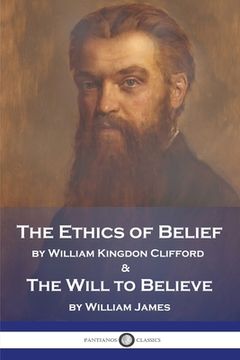Share
The Ethics of Belief and The Will to Believe
William James
(Author)
·
William Kingdon Clifford
(Author)
·
Pantianos Classics
· Paperback
The Ethics of Belief and The Will to Believe - Clifford, William Kingdon ; James, William
Choose the list to add your product or create one New List
✓ Product added successfully to the Wishlist.
Go to My Wishlists
Origin: U.S.A.
(Import costs included in the price)
It will be shipped from our warehouse between
Monday, June 17 and
Wednesday, July 03.
You will receive it anywhere in United Kingdom between 1 and 3 business days after shipment.
Synopsis "The Ethics of Belief and The Will to Believe"
William Kingdon Clifford's excellent treatise The Ethics of Belief is in this edition united with The Will to Believe; the spirited response by William James.This book brings together the two essays which comprise the famous philosophical exchange between the mathematician William Kingdon Clifford and William James, a psychologist and philosopher. Famous for articulating the arguments and morality surrounding belief, these two papers are united in a single compact edition for the consideration and study of the reader.The chief difference in opinion between Clifford and James, surrounds the matter of evidence. Clifford argued that belief in anything without supporting evidence is folly; individuals should hold an intellectual duty as well as a moral duty in what they believe. Wishful thinking, supposition, assumptions, or blind faith are therefore unacceptable and can act to damage one's intellect and ability to reason.William James, in opposition to Clifford's view, states that the formation of beliefs is justifiable. He uses the athlete as one example; self-belief in one's abilities or capacity for achievement can provision a psychological edge that results in such beliefs being realized.James then proceeds to outline a number of conditions which seek to justify the phenomena of religious belief as an intellectual and moral occurrence. That the issue of whether God exists is intellectually undecidable is central to James's thesis: a person can, without impinging on their intellect or morals, choose to believe or not to believe in a deity.Both Clifford and James draw upon the established epistemic norms of philosophy, these being the principles which seekers of knowledge and truth should hold when acquiring a belief. Their exchange served to refine the norms in scholarly circles, ushering in a renewed and sustained interest in belief morality.A total of almost two decades elapsed between Clifford and James papers, and Clifford himself died in 1879. However the succinctness of James' reply - which acts as an effective summary for the arguments within many of his lengthier works - brought both his paper and the paper of Clifford to prominence in academic circles.
- 0% (0)
- 0% (0)
- 0% (0)
- 0% (0)
- 0% (0)
All books in our catalog are Original.
The book is written in English.
The binding of this edition is Paperback.
✓ Producto agregado correctamente al carro, Ir a Pagar.

